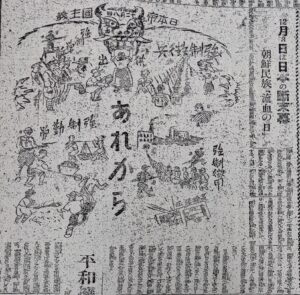For my third post that I am making during my stay in Korea, I thought it would only be fitting to give voice to some long-forgotten Korean writers who have something crucial to say about their experiences under Imperial Japanese rule. I found their editorial and illustration in the old Japanese-language newspaper archives at the National Library of Korea.
The article I'm sharing today was published on December 8th, 1945 and written by the Korean employees of the Keijo Nippo newspaper. For those unfamiliar, Keijo Nippo had been the official propaganda newspaper under the Imperial Japanese colonial regime, which had dominated Korea from 1905 to 1945. In early November 1945, the Korean employees took over the newspaper from their Japanese bosses, transforming a tool of oppression into a platform for liberation.
Though short, this editorial serves as a strong indictment against the crimes, injustices, and inhumanities perpetrated by Imperial Japan. Accompanying the editorial is a drawing that vividly illustrates the suppression of free speech (言論弾圧), forced conscription (強制徴兵), forced student soldiers (強制学兵), forced labor (強制勤労), forced requisition (強制徴用), and contributions (供出) under Japanese Imperialism (日本帝国主義).

[Translation]
Keijo Nippo (Gyeongseong Ilbo) December 8, 1945
Commemorating the End of Japan's Imperial Rule on December 8th
The Korean Nation's 'Day of Bloodshed'
When we recall December 8th, we realize that, from that day on, our Korean compatriots were bound by the iron net of Japanese imperialism, and they shed their precious blood in the sky, sea, and fields, along with their countless pure souls. The more we think about it, the more painful the bloodshed becomes, making our teeth chatter and filling us with intense emotions.
The harsh reality that drove thirty million of our compatriots to the brink of death, while falsely promoting the idea of "Japanese-Korean Unification," has clearly unfolded before our eyes. Conscription, mobilization, labor, contributions, and requisitions — all were forced upon us.
Countless many compatriots who left their fathers and were separated from their siblings and spouses have buried their angry wave of deep resentment in the lands of the Asian continent. They must now be quietly celebrating this great liberation and nation-building.
Four years have passed since the beginning of Japan's imperial invasion of the East and the Pacific War! Today, we observe December 8th at the very location where liberation occurred precisely on that day [on August 15th]! This day is one of historical significance, a day of cheers from thirty million people. Four years of hardship and endurance! How did we manage to live through all of this? We had mouths but were restrained from practicing freedom of speech, and we endured unbearable exploitation and oppression. Look at this record of blood, endured with hardships and bitterness, inflicted upon us by Japanese imperialism since that day on December 8th.
[Transcription]
京城日報 1945年12月8日
12月8日は日本の断末幕
朝鮮民族「流血の日」
想い起こせば、あの日十二月八日、あれから朝鮮同胞は日本帝国主義の鉄鋼網に縛られて尊い血を空に海に野に無限の純魂と共に流されたのである。ああ想えば想うほどくやしい流血であった。歯根もふるえ、熱腸九廻の思いをする。
内鮮一体という偽装の看板を高く掲げて三千万わが同胞を死の彼岸へ追い込んだ痛烈なる現実がわれわれの眼前にはつきりと展開されたではないか。徴兵も徴兵の出陣も勤労、供出、徴用すべてが強制でないものはかなかった。
父親の膝下を離れ、兄弟妻子に離別した幾多の同胞が大陸の地に怒濤の波に千秋の怨恨を埋めて、いま静かにこの大なる解放建国を祝うに違いない。
日本帝政の東洋侵略への末幕大東亜戦争から満四年!きょうこの日がちょうどその日であった解放の處に迎える十二月八日!この日は世紀的感激が燃えたつ三千万の歓呼の日である。困苦忍耐の四年!われわれはどんなにして生きて来たのか。口あれど言論の自由を拘束され酷使と圧迫に堪え難きものがあった。あの日!あの十二月八日からの日本帝政に加えられた臥薪嘗胆の血の記録を見よ。
Edit: The very last line of the transcription was corrected to あの十二月八日からの日本帝政に加えられた臥薪嘗胆の血の記録を見よ。This is to be translated as, "Look at the record of blood, endured with hardships and bitterness, inflicted upon us by the Imperial Japanese regime since December 8th."




No comments:
Post a Comment